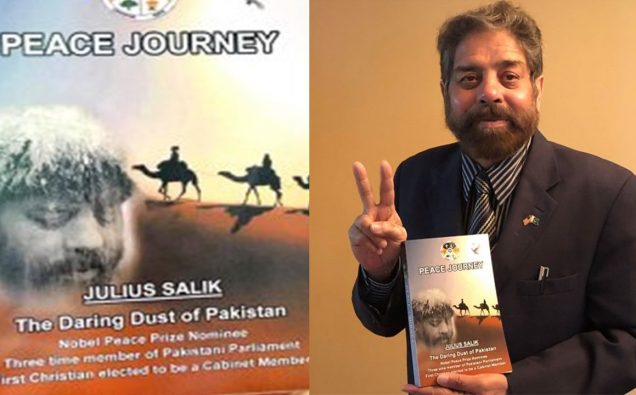
Julius Salik is speaking for minorities, and reminding us all of Pakistan’s forgotten ideals of egalitarianism. This time, though, Salik is speaking through his book Peace Journey that chronicles his daring protests and struggles as a political figure and a voice of Pakistan’s Christian and other minorities.
In a world riven along ethnic, racial and religious lines, Salik has remained a steadfast voice for equality, harmony and peaceful coexistence. As federal minister, peace proponent and a popular figure, Salik has lived through travails of Pakistan’s turbulent last 25 years, which pitched the country’s moderate majority population and minorities against militant mindset.
J Salik, as he is commonly known as, responded to instances of state discrimination, societal injustice against members of his Christian community and other minorities as well as political corruption with courageous and novel ways of protestations.
In the sweltering summer of 1983, Salik assembled thousands of Christians in a camp in Lahore to press demand for joint electorate but faced Police brutality despite keeping his supporters peaceful.
In 1995, during the height of Bosnian war, he walked into the horror to diffuse the impression that it was some kind of religious conflict, and emphasize humanity of all people. He would throw dust on his head to protest, take his belongings out of his home on camel backs, become a figure fixed on cross and confine himself to a cage in reaction to injustice around him, and to express solidarity with people of all painful socioeconomic divisions – color, class and creed.
“Calling Julius Salik eccentric would actually be an understatement. Some may even call him mad, but none can doubt his sincere and deep compassion, not only for his fellow Pakistani Christian community but for the human condition as a whole,” culture critic Nadeem F. Piracha wrote in a 2012 Dawn piece “Pakistan’s Crazy Diamonds.”
But all along, since diving into his lifelong struggle for equality and fair representation of people, Salik has adhered to the principle of method in madness:
“Love of my community, love of all minorities, love of humanity and love of my country.”
All this, of course, demanded a lot of personal sacrifice, unflinching commitment and courage from Salik, who also witnessed some of the key political developments that shaped Pakistan – from being a federal minister in late prime minister Benazir Bhutto’s cabinet to an advocate of the minorities on the streets and roads of Islamabad and Lahore and to rises and falls of the democratic leaders and the role of powers that be.
Pakistani leaders have acknowledged Salik’s struggles and contributions. For example, the Benazir Bhutto government nominated him for Nobel Peace Prize in 1990s. Pakistani expatriates have expressed support for his idea of World Minorities Alliance.

Now, 70, Salik has documented his struggles in Peace Journey, where the “daring dust of Pakistan” recounts and relives some of the defining moments of his political life and protests.
He finds it particularly painful that Pakistan, a country founded to safeguard the rights and future of a minority, Indian Muslims, has not lived up to its promise of protection of its own minorities, inclusiveness and pluralism as envisioned by its founders.
Yet, he has unswerving faith in Pakistan and its people. In the book, Salik often quotes from statements of poet Iqbal and founder Muhammad Ali Jinnah to remind people and leaders of the country’s foundation principles and commitment to an egalitarian society.
As a realist, he is conscious that Pakistan’s struggles for equality call for continuing efforts.
“I am not the one who lives away from the homeland of my people and ancestors, I want to live with my people, listen to them and work for them,” Salik, who is in Washington D.C. to promote his book, told Views and News.
Salik will launch his book in Washington D.C. area, and plans to stay true to his novelty of expression.
“I am working to bring soil from my native country to experience myself as the daring dust of Pakistan,” says Salik.
The book, published by Page Publisher New York, is available on Amazon and Salik has hosted a website PeaceJourneyBook.com to make it easier for people to access the book.













